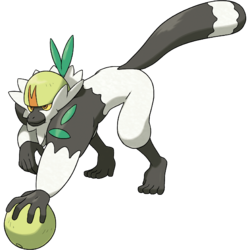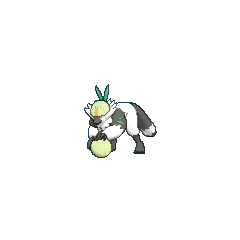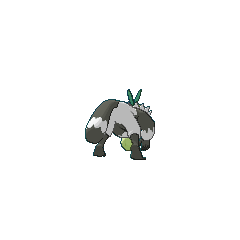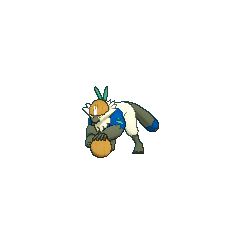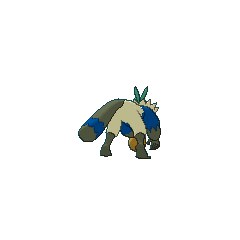From Bulbapedia, the community-driven Pokémon encyclopedia.
Passimian (Japanese: ナゲツケサル Nagetukesaru) is a Fighting-type Pokémon introduced in Generation VII.
It is not known to evolve into or from any other Pokémon, but it is considered to be a counterpart of Oranguru.
Biology
Passimian is a black-and-white Pokémon resembling a powerfully built lemur with broad shoulders. Most of its fur is white, but it has a black muzzle, upper body, hands, feet and ankles, and tail. However, there is a wavy white ring near the tip of its tail. The fur around its head and face is longer and forms many small clumps, especially around the top of its head and under its chin. On top of its head is a pale green helmet similar to half of a coconut shell. The helmet has a small orange blaze on the front and two leaves that stand up straight attached to the back. Its eyes are partially hidden by its headwear, but its yellow sclerae and reddish-orange irises are visible. There are two oval, green markings or leaves on each shoulder and its chest. In the anime, the green markings are referred to as (Japanese: メレメレグリーンズ Melemele Greens) and the ones from Akala Island have red markings and are referred to as (Japanese: レッドバンズ Red Bands). In each area, one marking is vertical and has a horizontal one below it. Passimian has humanoid hands and feet, and a long tail with a rounded tip. It is often seen carrying a large Berry that looks like a green coconut.
This Pokémon creates troops of 20 to 30 members. Each troop has a leader that picks 10 of the strongest members to search for food. It uses its saliva to stick leaves on its a shoulders in certain positions that distinguishes its troop from others, which the leader is in charge of choosing. This Pokémon’s battle strategy involves throwing Berries at opponents, hard ones for damage and soft ones to obscure vision, and confusing opponents by throwing the Berry to other troop members. A troop's leader is the member that can throw these Berries the farthest. Through rigorous training, the troop improves its coordination, teamwork, and skill in handling Berries. Some Passimian are unable to handle the intensity, and flee from the troop. In place of a troop leader, a captive Passimian looks to its Trainer for leadership. If its Trainer has poor form when throwing Poké Balls, it will refuse to obey.[1]
In the anime
Major appearances
Multiple Passimian made their anime debut in SM064. There were two groups. One has green markings and are from a forest behind Iki Town on Melemele Island. They are referred to as (Japanese: メレメレグリーンズ Melemele Greens) and their leader is nicknamed (Japanese: タイニー Tiny). The other have red markings and are from Akala Island. They are referred to as (Japanese: レッドバンズ Red Bands) and their leader is nicknamed (Japanese: カギヅメ Kagizume).
In the manga
In the Pokémon Adventures manga
A Passimian appeared in Lush Jungle in PASM11.
In the TCG
- Main article: Passimian (TCG)
Game data
Pokédex entries
| This Pokémon was unavailable prior to Generation VII.
|
| Generation VII
|
|
| Sun
|
They form groups of roughly 20 individuals. Their mutual bond is remarkable—they will never let down a comrade.
|
| Moon
|
They battle with hard berries for weapons. Their techniques are passed from the boss to the group, generation upon generation.
|
| Ultra Sun
|
They use their saliva to stick leaves to their shoulders. You can tell what troop they belong to from the position of the leaves.
|
| Ultra Moon
|
Berries are its weapons as well as the staple of its diet. The one that can throw a berry the farthest is the boss of the troop.
|
|
|
Game locations
| This Pokémon was unavailable prior to Generation VII.
|
|
|
In side games
In events
Held items
Stats
Base stats
| Stat
|
Range
|
| At Lv. 50
|
At Lv. 100
|
100
|
|
160 - 207
|
310 - 404
|
120
|
|
112 - 189
|
220 - 372
|
90
|
|
85 - 156
|
166 - 306
|
40
|
|
40 - 101
|
76 - 196
|
60
|
|
58 - 123
|
112 - 240
|
80
|
|
76 - 145
|
148 - 284
|
Total: 490
|
Other Pokémon with this total
|
- Minimum stats are calculated with 0 EVs, IVs of 0, and (if applicable) a hindering nature.
- Maximum stats are calculated with 252 EVs, IVs of 31, and (if applicable) a helpful nature.
|
Type effectiveness
| Under normal battle conditions in Generation IX, this Pokémon is:
|
|
|
|
|
|
|
|
|
|
|
|
|
Learnset
|
|
|
|
- Bold indicates a move that gets STAB when used by Passimian
- Italic indicates a move that gets STAB only when used by an Evolution of Passimian
|
|
|
|
|
- Bold indicates a move that gets STAB when used by Passimian
- Italic indicates a move that gets STAB only when used by an Evolution of Passimian
|
|
|
|
|
- Moves marked with an asterisk (*) must be chain bred onto Passimian in Generation VII
- Moves marked with a double dagger (‡) can only be bred from a Pokémon who learned the move in an earlier generation.
- Moves marked with a superscript game abbreviation can only be bred onto Passimian in that game.
- Bold indicates a move that gets STAB when used by Passimian
- Italic indicates a move that gets STAB only when used by an Evolution of Passimian
|
|
|
|
|
- A black or white abbreviation in a colored box indicates that Passimian can be tutored the move in that game
- A colored abbreviation in a white box indicates that Passimian cannot be tutored the move in that game
- Bold indicates a move that gets STAB when used by Passimian
- Italic indicates a move that gets STAB only when used by an Evolution of Passimian
|
|
|
|
|
- A superscript level indicates that Passimian can learn this move normally in Generation VII
- Bold indicates a move that gets STAB when used by Passimian
- Italic indicates a move that gets STAB only when used by an Evolution of Passimian
|
Side game data
Evolution
Sprites
| This Pokémon was unavailable prior to Generation VII.
|
|
|
Trivia
- Passimian can be seen as a counterpart to Oranguru. Both are primate-like Pokémon with the same base stat total. While Passimian is exclusive to Pokémon Sun, Oranguru is exclusive to Pokémon Moon.
- Despite not being associated with a certain group, both Passimian and Oranguru are listed in the same Pokédex page in Pokémon Sun and Moon. The same trait is true with Tauros and Miltank.
Origin
Passimian appears to be based on a lemur, with a striking resemblance to the black-and-white ruffed lemur. Lemurs also live in large groups and are very cooperative in activities like searching for food, like Passimian. It may also draw inspiration from quarterbacks in American football.
Name origin
Passimian may be a combination of pass and simian. It may also be a play on prosimian.
Nagetukesaru may be a combination of 投げつける nagetsukeru (to throw) and 猿 saru (monkey).
In other languages
| Language
|
Title
|
Meaning
|
 Japanese Japanese
|
ナゲツケサル Nagetukesaru
|
From 投げつける nagetsukeru and 猿 saru
|
 French French
|
Quartermac
|
From quarterback and maki or macaco
|
 Spanish Spanish
|
Passimian
|
Same as English name
|
 German German
|
Quartermak
|
From quarterback and maki
|
 Italian Italian
|
Passimian
|
Same as English name
|
 Korean Korean
|
내던숭이 Naedeonsung-i
|
From 내던지기 naedeonjigi and 원숭이 wonsung-i
|
 Mandarin Chinese Mandarin Chinese
|
投擲猴 / 投掷猴 Tóuzhíhóu / Tóuzhìhóu
|
From 投擲 / 投掷 tóuzhí / tóuzhì and 猴 hóu
|
 Cantonese Chinese Cantonese Chinese
|
投擲猴 Tàuhjaahkhàuh
|
From 投擲 tàuhjaahk and 猴 hàuh
|
|
|
|
| More languages
|
 Russian Russian
|
Пассимиан Passimian
|
Transcription of English name
|
|
|
|
Related articles
Notes
External links

|
This Pokémon article is part of Project Pokédex, a Bulbapedia project that aims to write comprehensive articles on each Pokémon species, as well as Pokémon groups and forms.
|
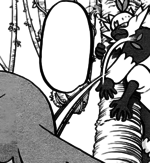
 For other sprites and images, please see Passimian images on the Bulbagarden Archives.
For other sprites and images, please see Passimian images on the Bulbagarden Archives.
